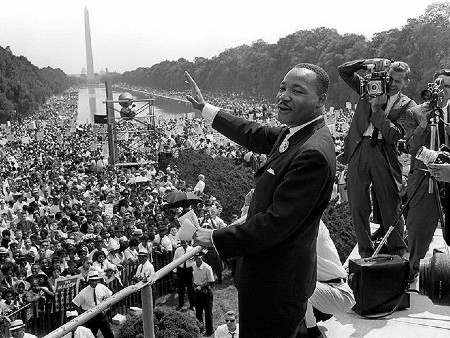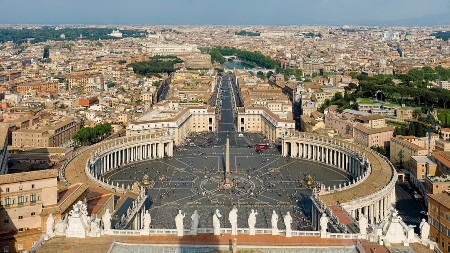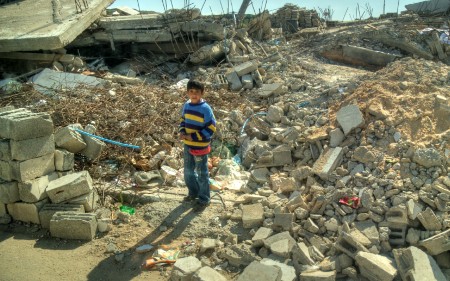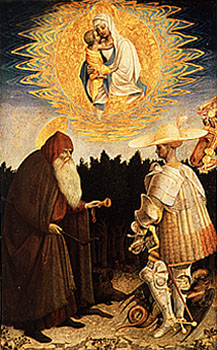Catholics and Orthodox: On Marriage and Family (Pt. II)
FREE Catholic Classes
The most suitable environment for the harmonious development of the child is the family, composed of a father, mother and siblings.
Highlights
TRENT, Italy (Zenit) - The final statement of the 1st European Catholic-Orthodox Forum on the theme: "The Family: A Good for Humanity" was held on Dec. 10-14, 2008 in Trent, Italy. (Catholic Online presents its conclusions in three parts, Editor)
****
B. Catholic Positions on Marriage and the Family
According to Catholic teaching, as affirmed also by the Orthodox, Jesus Christ raised natural marriage to the dignity of a sacrament: "The marriage covenant, by which a man and a woman establish between themselves a partnership of their whole life and which of its own very nature is ordered to the well-being of the spouses and to the procreation and upbringing of children, has, between the baptized, been raised by Christ the Lord to the dignity of a sacrament" (CIC can. 1055 - §1).
This sacramental value requires fidelity unto death among the spouses in the indissolubility of the marriage bond. Marital love between the spouses is the basis of the family, the first personal communion into which a human being is born. It must be promoted by society as its fundamental cell. The Catholic Church recognises the inseparable link willed by God between the unitive and procreative meanings of married love. Exclusion of offspring is therefore contrary to the unity of marital love. Sexuality is recognized as a dimension of the image of God in human beings and so has a personal value. Men and women must learn in the language of the body their vocation to responsible love as a true gift of themselves. Other sexual expressions such as fornication, homosexual acts and sexual unions outside marriage are contrary to this vocation to love.
II. Mission of the Family
After outlining some elements of the teachings of our Churches, we also underlined how much we hold in common. And so we would like to underline the following issues that we together consider important for the well-being of society.
A. Key Common Points
God's commandment to the first human family remains relevant to all subsequent families: "Be fruitful and multiply, and fill the earth and subdue it" (Gen 1:28). Catholics and Orthodox agree that the family is the unique moral environment in which the gift of human life should be transmitted by the marital act.
The human being is the only one created in the image and likeness of God and this constitutes his particular dignity. We do not give life to ourselves, nor are parents the sole source of human life, since divine intervention is necessary. The sacredness of human life from conception to natural death should be fully respected.
We acknowledge the positive international documents that support the family. For instance, art. 16 of the Universal Declaration of Human Rights states that: "Man and woman of full age, without any limitation due to race, nationality or religion, have the right to marry and to found a family" and "the family is the natural and fundamental group of society and is entitled to protection by society and the State." In the past the family and childbirth were regarded as something sacred. In recent years, however, these notions are questioned. There is an attempt to change language and introduce ambiguity into international documents under the ideological introduction of the gender theory.
Today both men and women are equally busy with the realization of their professional potential, and both have to bear the burden of financial responsibility for the family. Under these circumstances the possibilities of bearing and rearing children are drastically reduced.
A particularly tragic phenomenon has emerged in twenty first century Europe. Due to wages that do not sustain families, hundred of thousands of mothers and fathers have had to leave their families to go to wealthier countries to provide for the basic needs of their families. This has resulted in increased numbers of divorces, and in great suffering to children, with many of them being deprived of the presence of their parents' love and care.
The secular vision prevailing in modern society often undermines the notion of motherhood as a personal vocation. It is sometimes devalued. We, Orthodox and Catholics together, insist on the sacredness of motherhood and on the need for society to respect it. Mothers who stay at home in order to raise and educate children should be afforded support both morally and financially. Their mission is in no way less important than that of other respected professions. Motherhood is a mission, and as such it deserves unconditional support and respect. The idea of fatherhood is also fundamental for society and it too needs to be rediscovered by contemporary society. It's impossible to speak of a fraternal society without fatherhood.
B. Family and Education
Having given the gift of life to their children, parents are their first educators. "The right and duty of parents to give education is essential, since it is connected with the transmission of human life; it is original and primary with regard to the educational role of others, on account of the uniqueness of the loving relationship between parents and children; and it is irreplaceable and inalienable, and therefore incapable of being entirely delegated to others or usurped by others". ("Familiaris Consortium," 36). Integral education within the family is not limited simply to the development of a child's natural gifts and capacities, but refers also to spiritual values, in particular the handing on of faith. Parents are to be the first witnesses of the Gospel. In the family life we learn the meaning of faith as the true light that guides a person's life.
The most suitable environment for the harmonious development of the child is the family, composed of a father, mother and siblings. Other bodies that help the family in education of their children must act in collaboration with parents, passing on the principles and values which always remain the parents' primary responsibility to transmit. In the context of education one often hears about the rights of the child. This is good but such rights must always be considered within the environment of the family.
The issue of "sex education" merits particular attention. Here, too, parents are the first teachers. The principle aim of such teaching is directed towards forming young people in the meaning of married love: "Education in love as self-giving is also the indispensable premise for parents called to give their children a clear and delicate sex education" (Ibid., 37). In the family, where we have the first experience of personal communion, we are introduced into love in all its dimensions: the family is the first place of personal socialization. Furthermore, parents must provide information proportionate to each stage of the individual development of their children. Other bodies, such as the school, for example, constitute, in this sense, an aid for parents.
Particular influence is brought to bear on the education of children and young people by the mass media that strongly condition family relations. Young people imitate the examples communicated through the media. Alongside many positives aspects, however, the means of communication unfortunately and increasingly present pornographic material and an individualist, egoistic culture.
Families that teach their children well, attentive to establishing proper relationships between all family members, constitute a valuable human capital that has great importance for society in both its economic and spiritual well-being. Family life creates culture: man learns the essential language of life and all that helps him become fully human. All culture, in its beginnings and in its development is a family event.
Join the Movement
When you sign up below, you don't just join an email list - you're joining an entire movement for Free world class Catholic education.

-

-
Mysteries of the Rosary
-
St. Faustina Kowalska
-
Litany of the Blessed Virgin Mary
-
Saint of the Day for Wednesday, Oct 4th, 2023
-
Popular Saints
-
St. Francis of Assisi
-
Bible
-
Female / Women Saints
-
7 Morning Prayers you need to get your day started with God
-
Litany of the Blessed Virgin Mary
Daily Catholic
 Daily Readings for Friday, January 17, 2025
Daily Readings for Friday, January 17, 2025 St. Anthony the Abbot: Saint of the Day for Friday, January 17, 2025
St. Anthony the Abbot: Saint of the Day for Friday, January 17, 2025 Prayer for a Blessing on the New Year: Prayer of the Day for Tuesday, December 31, 2024
Prayer for a Blessing on the New Year: Prayer of the Day for Tuesday, December 31, 2024- Daily Readings for Thursday, January 16, 2025
- St. Fursey: Saint of the Day for Thursday, January 16, 2025
- St. Theresa of the Child Jesus: Prayer of the Day for Monday, December 30, 2024
![]()
Copyright 2024 Catholic Online. All materials contained on this site, whether written, audible or visual are the exclusive property of Catholic Online and are protected under U.S. and International copyright laws, © Copyright 2024 Catholic Online. Any unauthorized use, without prior written consent of Catholic Online is strictly forbidden and prohibited.
Catholic Online is a Project of Your Catholic Voice Foundation, a Not-for-Profit Corporation. Your Catholic Voice Foundation has been granted a recognition of tax exemption under Section 501(c)(3) of the Internal Revenue Code. Federal Tax Identification Number: 81-0596847. Your gift is tax-deductible as allowed by law.







 Daily Readings for Friday, January 17, 2025
Daily Readings for Friday, January 17, 2025 St. Anthony the Abbot: Saint of the Day for Friday, January 17, 2025
St. Anthony the Abbot: Saint of the Day for Friday, January 17, 2025 Prayer for a Blessing on the New Year: Prayer of the Day for Tuesday, December 31, 2024
Prayer for a Blessing on the New Year: Prayer of the Day for Tuesday, December 31, 2024

